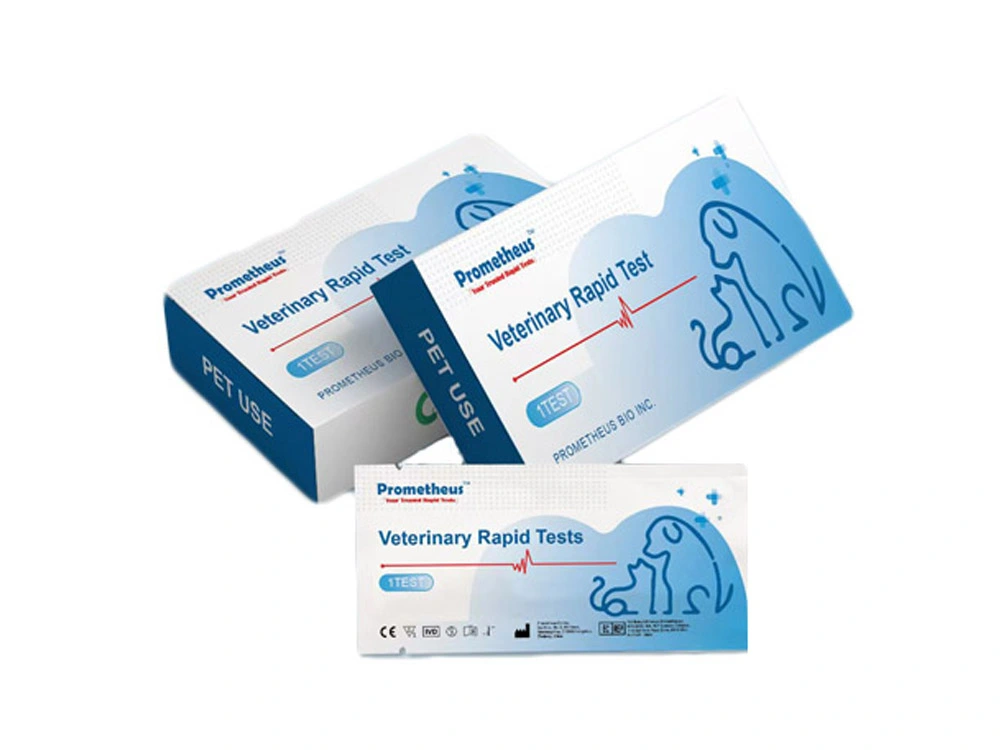The Canine Coronavirus Antigen (CCV Ag) Test is a diagnostic test used to detect the presence of the canine coronavirus antigen in a dog's fecal sample.

The Canine Coronavirus Antigen (CCV Ag) Test is a diagnostic tool used to detect the presence of Canine Coronavirus in dogs. This test helps in identifying the antigen associated with the virus, allowing for early detection and appropriate treatment. The CCV Ag Test provides reliable and rapid results, aiding in managing the health of canines effectively.
Rapid and reliable results.
Accurate detection of Canine Coronavirus antigens.
User-friendly and easy to use.
Early intervention and prevention of virus spread.
Convenient for veterinary clinics or home use.
Effective canine health management.
High sensitivity and specificity.
Prevention of transmission to other animals.
Trusted and reliable diagnostic tool.
Comprehensive care for canines.
| Product Name | Canine Coronavirus Antigen (CCV Ag) Test |
| Format/Shape | Cassette |
| Specimen | Feces/Vomit |
| Time to Result | 5-10 minutes |
| Service | OEM available |
| Shelf Life/Validity | 24 months |
| Storage | Between 2-30°C |
| Packing | 1,10T |
| Manufacture | Prometheus Bio Inc. |
The Canine Coronavirus Antigen (CCV Ag) Test is a diagnostic test used to detect the presence of the canine coronavirus antigen in a dog's fecal sample.
The CCV Ag Test is performed to diagnose canine coronavirus infection in dogs. It is especially important for identifying infected dogs in kennels, shelters, or multi-dog households to prevent the spread of the virus.
The CCV Ag Test is conducted by collecting a small amount of fecal sample from the dog and applying it to a test strip or device. The test strip or device contains specific antibodies that can detect the presence of the canine coronavirus antigen if present in the fecal sample.
The CCV Ag Test usually provides rapid results within a few minutes. The test strip or device will display a specific color or line indicating the presence or absence of the canine coronavirus antigen.
The CCV Ag Test is generally accurate in detecting the presence of the canine coronavirus antigen. However, false-negative or false-positive results may occur due to various factors such as timing of the infection or cross-reactivity with other viral antigens.
Canine coronavirus is highly contagious among dogs and can spread through contact with infected fecal matter. It is most commonly transmitted in environments with high dog density, such as kennels or shelters.
Symptoms of canine coronavirus infection may include diarrhea, vomiting, loss of appetite, lethargy, and dehydration. In severe cases, it can lead to intestinal damage and secondary bacterial infections.
Canine coronavirus infection can be prevented by ensuring good hygiene practices, such as regular cleaning and disinfection of kennels or living spaces. Vaccination against canine coronavirus is also available and recommended for at-risk dogs.
Currently, there are no specific antiviral treatments for canine coronavirus infection. However, supportive care such as fluid therapy and medication to manage symptoms can be provided to affected dogs.
No, canine coronavirus is species-specific and does not infect humans. Humans are not at risk of contracting canine coronavirus from infected dogs.

 Email Us:
Email Us:  TEL:
TEL:  2nd floor, No. 3, 8th Street, Qiantang Area, Hangzhou, Zhejiang, China
2nd floor, No. 3, 8th Street, Qiantang Area, Hangzhou, Zhejiang, China